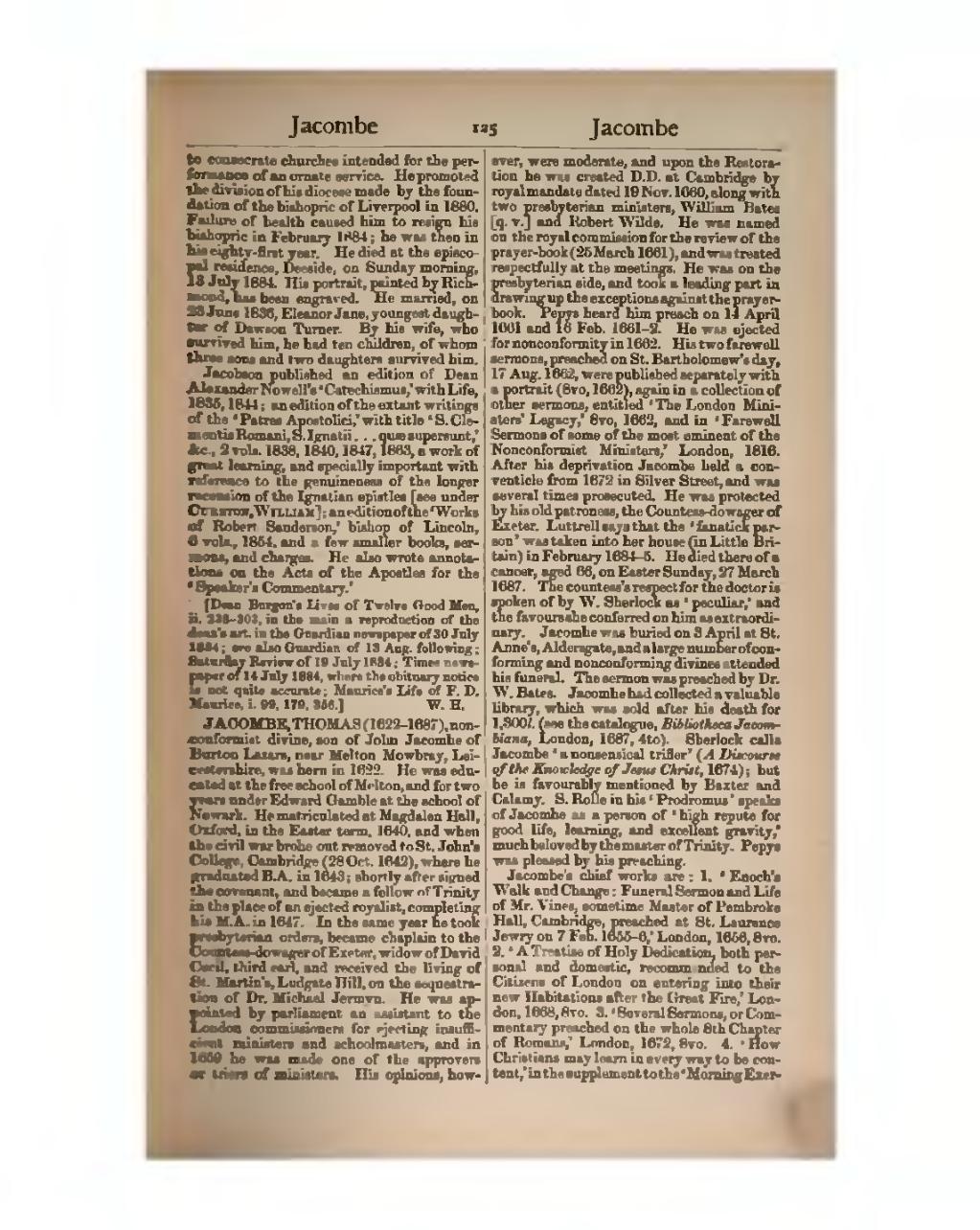to consecrate churches intended for the performance of an ornate service. He promoted the division of his diocese made by the foundation of the bishopric of Liverpool in 1880. Failure of health caused him to resign his bishopric in February 1884; he was then in his eighty-first year. He died at the episcopal residence, Deeside, on Sunday morning, 13 July 1884. His portrait, painted by Richmond, has been engraved. He married, on 23 June 1836, Eleanor Jane, youngest daughter of Dawson Turner. By his wife, who survived him, he had ten children, of whom three sons and two daughters survived him.
Jacobson published an edition of Dean Alexander Nowell's ‘Catechismus,’ with Life, 1835, 1844; an edition of the extant writings of the ‘Patres Apostolici,’ with title ‘S. Clementis Romani, S. Ignatii … quæ supersunt,’ &c., 2 vols. 1838, 1840, 1847, 1863, a work of great learning, and specially important with reference to the genuineness of the longer recension of the Ignatian epistles [see under Cureton, William]; an edition of the ‘Works of Robert Sanderson,’ bishop of Lincoln, 6 vols., 1854, and a few smaller books, sermons, and charges. He also wrote annotations on the Acts of the Apostles for the ‘Speaker's Commentary.’
[Dean Burgon's Lives of Twelve Good Men, ii. 238–303, in the main a reproduction of the dean's art. in the Guardian newspaper of 30 July 1884; see also Guardian of 13 Aug. following; Saturday Review of 19 July 1884; Times newspaper of 14 July 1884, where the obituary notice is not quite accurate; Maurice's Life of F. D. Maurice, i. 99, 179, 356.]
JACOMBE, THOMAS (1622–1687), nonconformist divine, son of John Jacombe of Burton Lazars, near Melton Mowbray, Leicestershire, was born in 1622. He was educated at the free school of Melton, and for two years under Edward Gamble at the school of Newark. He matriculated at Magdalen Hall, Oxford, in the Easter term, 1640, and when the civil war broke out removed to St. John's College, Cambridge (28 Oct. 1642), where he graduated B.A. in 1643; shortly after signed the covenant, and became a fellow of Trinity in the place of an ejected royalist, completing his M.A. in 1647. In the same year he took presbyterian orders, became chaplain to the Countess-dowager of Exeter, widow of David Cecil, third earl, and received the living of St. Martin's, Ludgate Hill, on the sequestration of Dr. Michael Jermyn. He was appointed by parliament an assistant to the London commissioners for ejecting insufficient ministers and schoolmasters, and in 1659 he was made one of the approvers or triers of ministers. His opinions, however, were moderate, and upon the Restoration he was created D.D. at Cambridge by royal mandate dated 19 Nov. 1660, along with two presbyterian ministers, William Bates [q. v.] and Robert Wilde. He was named on the royal commission for the review of the prayer-book (25 March 1661), and was treated respectfully at the meetings. He was on the presbyterian side, and took a leading part in drawing up the exceptions against the prayer-book. Pepys heard him preach on 14 April 1661 and 16 Feb. 1661–2. He was ejected for nonconformity in 1662. His two farewell sermons, preached on St. Bartholomew's day, 17 Aug. 1662, were published separately with a portrait (8vo, 1662), again in a collection of other sermons, entitled ‘The London Ministers' Legacy,’ 8vo, 1662, and in ‘Farewell Sermons of some of the most eminent of the Nonconformist Ministers,’ London, 1816. After his deprivation Jacombe held a conventicle from 1672 in Silver Street, and was several times prosecuted. He was protected by his old patroness, the Countess-dowager of Exeter. Luttrell says that the ‘fanatick parson’ was taken into her house (in Little Britain) in February 1684–5. He died there of a cancer, aged 66, on Easter Sunday, 27 March 1687. The countess's respect for the doctor is spoken of by W. Sherlock as ‘peculiar,’ and the favours she conferred on him as extraordinary. Jacombe was buried on 3 April at St. Anne's, Aldersgate, and a large number of conforming and nonconforming divines attended his funeral. The sermon was preached by Dr. W. Bates. Jacombe had collected a valuable library, which was sold after his death for 1,300l. (see the catalogue, Bibliotheca Jacombiana, London, 1687, 4to). Sherlock calls Jacombe ‘a nonsensical trifler’ (A Discourse of the Knowledge of Jesus Christ, 1674); but he is favourably mentioned by Baxter and Calamy. S. Rolle in his ‘Prodromus’ speaks of Jacombe as a person of ‘high repute for good life, learning, and excellent gravity,’ much beloved by the master of Trinity. Pepys was pleased by his preaching.
Jacombe's chief works are: 1. ‘Enoch's Walk and Change: Funeral Sermon and Life of Mr. Vines, sometime Master of Pembroke Hall, Cambridge, preached at St. Laurence Jewry on 7 Feb. 1655–6,’ London, 1656, 8vo. 2. ‘A Treatise of Holy Dedication, both personal and domestic, recommended to the Citizens of London on entering into their new Habitations after the Great Fire,’ London, 1668, 8vo. 3. ‘Several Sermons, or Commentary preached on the whole 8th Chapter of Romans,’ London, 1672, 8vo. 4. ‘How Christians may learn in every way to be content,’ in the supplement to the ‘Morning Exer-
